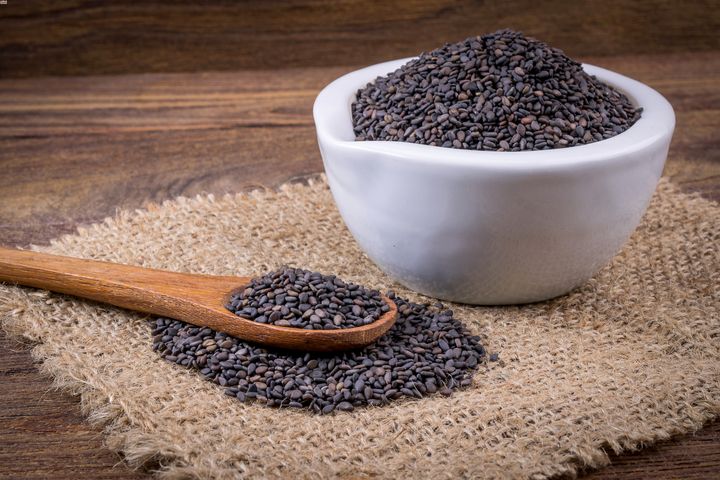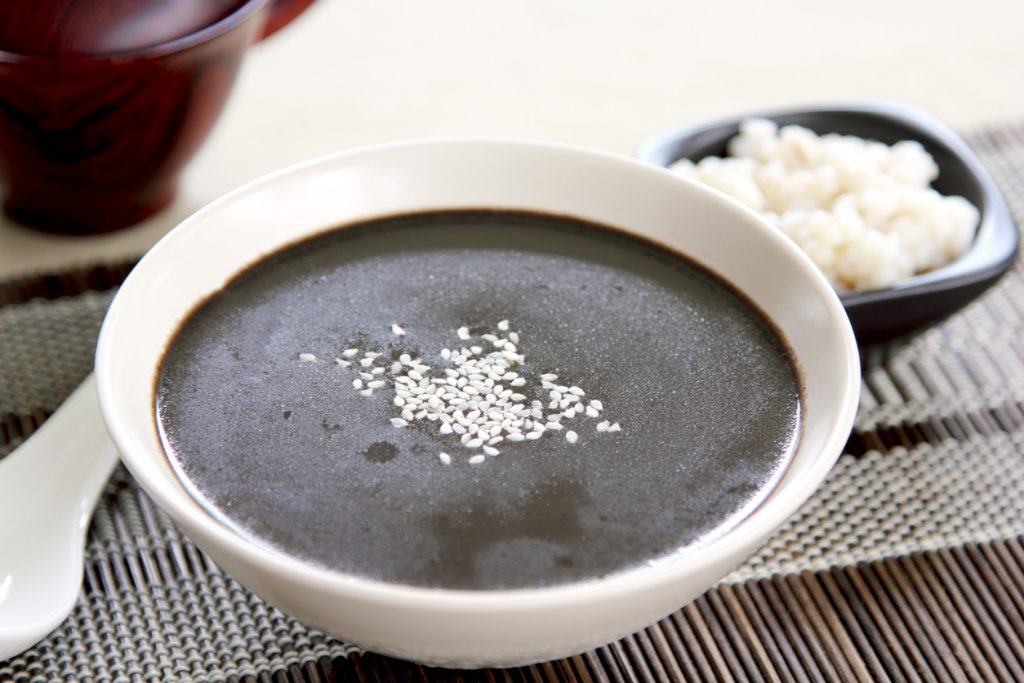Black Sesame

What is Black Sesame?
Black Sesame (黑芝麻), also known as kala til, is one of the oldest condiments known to man. The famous phrase from the Arabian Nights — “Open Sesame” —refers to the seed’s distinguishing feature of bursting open when it reaches maturity. Black Sesame seeds are small, flat and oily seeds that grow in the fruit pods of the Sesamum indicum plant. Full of healthy fats, antioxidants, protein and minerals, Black Sesame is harvested in the Autumn, and its seeds are then extracted to be dried under the Sun.
According to the Compendium of Materia Medica, it is said that consuming Black Sesame for a hundred days can prevent many ailments: In the first year, the facial complexion will become vibrant and plump; In the second year, grey hair will be restored to black hair; In the third year, teeth will start to grow back. In Traditional Chinese Medicine (TCM), it is believed that Black Sesame can help individuals live healthily till old age.
In TCM, Black Sesame falls under the category of ‘Laxative herbs that drain downwards’. As it is rich in oils, it is a great herb to treat constipation by lubricating the intestines to remove the stools from the body. Also, neutral in nature, Black Sesame does not affect the yin-yang balance in the human body.
Sweet in taste, this dark-colored food tends to slow down acute reactions and detoxify the body. They also have a tonic effect because they can help to replenish qi and blood. In particular, Black Sesame targets the Kidneys and the Liver.

Functions and Benefits of Black Sesame
Traditional Chinese Medicine (TCM) shows that Black Sesame has 3 main functions:
Black Sesame helps to tonify the Liver and Kidneys. In TCM, the Liver is in charge of regulating the movements of qi and body fluid, as well as balancing our emotions. On the other hand, the Kidneys are in charge of regulating the urinary system, the reproductive system and the ageing process. Hence, Black Sesame is often used to relieve blurred vision, dizziness, tinnitus, increase the production of breast milk, and reverse premature salt and pepper hair.
Black Sesame can nourish blood and jing. This herb is often used to relieve headache, dizziness and numbness caused by Blood or Yin Deficiency.
Black Sesame helps to cure constipation caused by dry intestines or Blood Deficiency. By lubricating the intestines and moistening Dryness, Black Sesame can promote movement in the large intestines.
Other than the above Black Sesame benefits, modern studies have also suggested that Black Sesame can enable us to have healthier hair, stronger bones and better skin. As these seeds are abundant in zinc and calcium, they can help to prevent osteoporosis and strengthen bones. Also, Black Sesame are also loaded with Vitamin E that can nourish the skin and eliminate toxins.
Black Sesame are also a rich source of phytosterol and magnesium, which can lower cholesterol levels, lower blood pressure, reduce the risk of heart diseases and maintain heart health. The sesamin found in Black Sesame also helps to protect against cancers such as colon cancer.

How to Use Black Sesame
The recommended daily dosage of Black Sesame is 9-30g.
Whole, dried Black Sesame are usually available in herbal shops and markets. They are often available in powder, pill, capsule and decoction form. The herb is also often made into Sesame Seed Oil. Some popular Black Sesame products include Black Sesame Powder, Black Sesame Balls, Black Sesame Paste and Black Sesame Soup.
Black Sesame can be consumed raw, toasted, or grounded into powder to sprinkle over rice, salads, mixed in muesli or oats, and even together with soy milk or other food products. You can incorporate these nutrient-rich seeds in your cereals, rice, noodles or any other dishes. You can even mix them in your dessert, such as yogurt or smoothie, for a rich and nutty flavour.
Black Sesame are also found on sushi rolls and Korean cooking, the latter to marinate meat and vegetables.
Cautions and Side Effects of Black Sesame
As Black Sesame are used to promote bowel movements, Black Sesame should not be used by patients who are experiencing diarrhoea or loose stools.
Also, if the individual is experiencing skin inflammation, such as rashes, it is best to avoid consuming Black Sesame before the condition improves.
While there are no known drug interactions with Black Sesame as of this writing, it is best to consult with your healthcare provider before taking any Black Sesame or any other related supplement.
Summary
Here is a summary for Black Sesame:
- Herb name (Chinese): 黑芝麻
- Herb name (Pin Yin): hēi zhī má
- Herb name (English): Black Sesame
- Herb name (Botanical): Semen Sesami Nigrum
- Origin of species: Sesamum indicum L.
- Part(s) of herb used: Seed
- Geo-specific habitat(s): All parts of China
- Taste(s) & Properties: Sweet; Neutral; Administrates the Kidney, Large Intestine and Liver meridians
- Actions: Eases symptoms of premature ageing, e.g. blurred vision, hair greying etc; Relieves constipation.
References
Mohammed, S., & Pattan, N. An Overview on Nutritional Composition and Therapeutic Benefits of Sesame Seeds (Sesamum indicum). [Accessed on 25th September 2022]
Zhou, L., Lin, X., Abbasi, A. M., & Zheng, B. (2016). Phytochemical contents and antioxidant and antiproliferative activities of selected black and white sesame seeds. BioMed research international, 2016. [Accessed on 25th September 2022]
Share this article on
